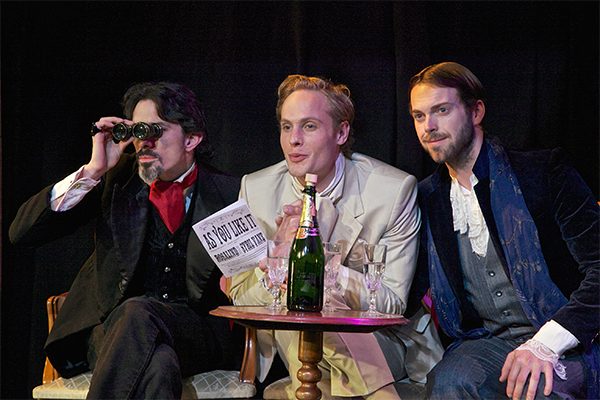Dorian Gray (Riverside Studios)

This new version by Linnie Reedman and Joe Evans is a dark, atmospheric and often devilish reimagining of Wilde’s novel, drawing on the original (and significantly more scandalous) 1890 edition and using music and song to emphasise Dorian’s descent into the seamy underbelly of Victorian life.
A strong cast, including newcomers Jack Fox and Daisy Bevan, the latest of the Fox and Redgrave families to take to the stage, conjure up a sense of scandal from the beginning, starting with too-long looks held between men and soon tumbling into murder, corruption and opium dens. This is a world of horribly distorted morality, but they certainly make it look rather fun.
Joe Wredden is a macabre delight as Lord Henry, a beguiling demon in his dark suit and pointed beard, leading the innocent Dorian (Jack Fox) into a pit of immoral, hedonistic pleasure-seeking and delivering Wilde’s aphorisms with relish. As his opposite, Basil Hallward, Antony Jardine is a charming dreamer, clinging helplessly to his idealised vision of Dorian despite all evidence to the contrary. Fox cuts a striking figure in his ivory suit, a Greek god cut in alabaster, often appearing still and statuesque amid the dark smokiness of the world he chooses to inhabit.
Katharine Heath‘s set design cleverly adapts to the various locations without taking the focus off the secret attic room and the painting itself, an empty frame looming menacingly upstage. The low, often sinister lighting, fading to black in mysterious corners, hints continually at events and actions unknown, just out of sight. The music and sound effects lend a real sense of Victorian melodrama and tension, creating a cohesive and engaging world in which it seems possible to follow through every grisly impulse and desire.
The action is brisk, and time constraints naturally mean that the arc of Dorian’s demise is a steep one. Although narration (from the excellent Fenton Grey as Mr Isaacs) and songs from the ensemble attempt to bridge some gaps, Act 2 drops rather suddenly and precipitously into its torrid conclusion.
There is a lot of focus, perhaps an unfair amount, on Fox and Bevan. Much of the publicity for the play has homed in on them and their dynastic lineage, and at moments this pressure showed. However, they are two young actors learning their craft, buoyed by a superb supporting cast, and the potential is undeniable.
Wilde’s humour is evident throughout, and the moral message of the pitfalls of promoting beauty and youth over honesty and integrity is clear. The play is a damning critique of Lord Henry’s hedonistic philosophy: ‘’I never pursued happiness, only pleasure. Who wants happiness?”
By the end the answer is abundantly clear: if you’ve just presented the alternative, then me, please.











